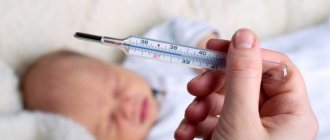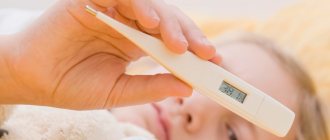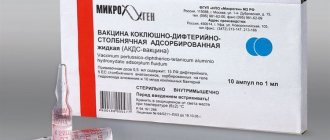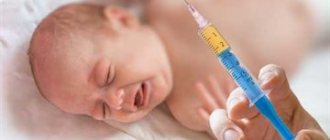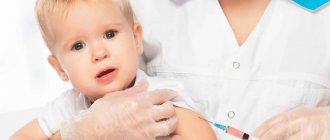One of the dangerous infectious diseases is polio. The causative agent of this pathology affects the nervous system, causes persistent paralysis and, in severe cases, leads to death. Therefore, you should not refuse vaccination against polio virus infection.
According to reviews from doctors and patients, immunization in most cases is tolerated normally, without pronounced symptoms. Some people complain that their temperature rises after receiving the polio vaccine. It is important to understand whether this reaction is normal or a sign of a complication developing.
Reactions in children to IPV and OPV
IPV and OPV are used for vaccination against polio.
The first type of vaccination contains an inactivated (killed) virus, and the second contains a live, but weakened causative agent of paralytic pathology. Immunization begins from infancy: the first injection is given at 3 months. The approved routine vaccination regimen involves a combination of IPV and OPV. This means that the first two injections are given as IPV, and the next four as OPV.
But, some parents prefer to carry out all immunoprophylaxis with an inactivated vaccine. The vaccine is an antigenic material that, when it enters the body, begins to stimulate the production of antibodies capable of destroying the polio pathogen with each subsequent artificial infection.
The process of formation of specific immunity in sensitive individuals is reflected in the condition. But, since IPV and OPV differ in the state of the pathogen and the form of release of the drug, the reactions after them are also different.
According to reviews from parents and pediatricians, inactivated vaccinations are much easier to tolerate. They are safer, but do not protect against wild polio virus, unlike OPV.
To figure out which type of drug is best for a child to inject, it is worth considering all possible reactions to both types of vaccines. The body may react differently to the administered drug.
All symptoms after immunization are divided into normal (expected) and pathological, which indicates complications. OPV, or oral polio vaccine, comes in the form of drops. The drug is administered into the body through the mouth.
The drug is dripped onto the tonsils or the root of the tongue. The solution has a salty-bitter taste. The reaction to OPV is usually mild. In most children, their health does not change after a live vaccination.
Sometimes babies may experience the following conditions:
- pain in the abdominal area;
- stool disorder;
- loss of appetite;
- sleep disturbance;
- weakness;
- nausea and single vomiting;
- cough;
- allergies in the form of slight redness, swelling of the injection site, rash on the body.
The likelihood of developing adverse reactions after IPV is lower than from OPV. This is explained by the fact that they contain killed, not live, polio pathogens. Inactivated vaccines are available as an injectable liquid. They are introduced into the body by placing an intramuscular injection in the thigh area.
The consequences of IPV can be:
- nausea;
- weakness;
- vomit;
- anxiety;
- tearfulness;
- redness, swelling, pain in the leg at the injection site.
The reactions to OPV and IPV described above are considered normal. Complications of OPV include vaccine-associated polio. Both vaccines can provoke severe allergic conditions such as angioedema and anaphylaxis.
The risk of complications increases especially when anti-poliomyelitis vaccines are combined with DTP.
Why is my child's immune system weakened?
Many people are familiar with these situations:
- As soon as the cold season begins, your child will definitely get sick
, and then the whole family. - It seems like you are buying expensive drugs, but they only work while you drink them, and after a week or two the baby gets sick again
. - You worry that your child’s immunity is weak
, very often illnesses take precedence over health. - You are afraid of every sneeze or cough.
It is necessary to strengthen YOUR CHILD'S IMMUNITY!
IPV vaccinations are well tolerated by children, and there are significantly fewer consequences in the post-vaccination period. More often, parents are concerned about the effects that occur after using a live vaccine.
Adverse reactions and effects after immunization against polio can be divided into 2 types:
- Normal reactions due to the immune system's response to the administered drug. They can occur after any of the polio vaccines.
- Complications in the form of VAP, when the low level of immune defense in the body is unable to cope with the weakened vaccine strain of poliovirus live vaccine.
The list of common post-vaccination reactions includes loose, somewhat rapid stools, mild pain in the stomach, nausea, and weakness. Allergic symptoms include not only rashes and itchy skin, but also nasal congestion and cough after polio vaccination. Usually these manifestations go away on their own after 1-2 days.
Can a fever occur after polio vaccination?
Fever from the polio vaccine is common. It usually increases after an inactivated vaccine. Hyperthermia indicates that the body has begun to produce antibodies and fight the introduced antigenic material. But temperature can also indicate the development of complications.
Doctors distinguish three degrees of hyperthermia:
- weak (up to 37.2 degrees);
- moderate (37.2-37.8);
- heavy (38-39 degrees).
A normal reaction is considered to be a slight increase in thermometer readings - up to 37.2-37.5 degrees. With this condition, the child may become capricious and eat poorly. This is a normal reaction and does not require medical attention.
If the temperature rises to 38-39 degrees, then symptomatic treatment is carried out. Prolonged hyperthermia indicates the development of complications in the form of an abscess, allergies, or infection with some infectious viral pathology.
Hyperthermia is not typical for OPV, so the increase in thermometer readings after live vaccination is associated with another pathological process in the body. After OPV, the temperature can rise if the child has developed vaccine-associated poliomyelitis. Then hyperthermia occurs 5-30 days after immunization. The condition is quite dangerous and requires medical attention.
How many days can it last?
Many parents are interested in how many days a fever can last after polio immunization. As a rule, post-vaccination hyperthermia does not last long.
The duration of the period of high temperature depends on the following factors:
- individual characteristics of the child’s body;
- degree of hyperthermia;
- compliance by physicians with the rules of asepsis and antiseptics;
- development of exacerbation of a chronic disease after immunization;
- infection of infectious viral etiology, against the background of weakened protective forces after the introduction of the vaccine.
If an elevated temperature is normal, it usually lasts for several days.
Video on the topic
Dr. Komarovsky tells what to do if the temperature rises after vaccination:
Thus, fever after polio vaccination is more often caused by IPV. Hyperthermia can have three stages and indicate the normal formation of immunity or the development of post-vaccination complications. If the temperature lasts longer than three days, then you should consult a doctor (especially if the condition worsens and new symptoms are added).
The increase in temperature that appears after polio vaccination is one of the reactions of the child’s body to the vaccine. It is precisely the reactions and consequences of the vaccine that many parents fear, and sometimes even refuse to vaccinate their baby.
Parents' concerns are generated by different opinions about drugs for vaccination against polio, information about the possible development of the disease after the use of a live vaccine - VAP or vaccine-associated polio.
Is it necessary to bring down high indicators?
Pediatrician Komarovsky considers minor (moderate) hyperthermia a normal condition that does not require drug therapy. If the thermometer readings are up to 37.8-38, you should not lower the temperature. At higher numbers it is necessary to use antipyretic drugs.
As a rule, doctors recommend giving your baby the following medications:
- Paracetamol;
- Ibuklin:
- Nurofen.
Various forms of medications are used. It is preferable to use candles for infants. If a child is prone to seizures, then pediatricians advise giving an antipyretic drug on the day and for several days after immunization to prevent fever and seizures.
It happens that mild hyperthermia is observed against the background of an allergic reaction (rash on the body, swelling of the injection area). In this case, it is recommended to use antihistamines. Small children are allowed to give Suprastin, Zodak and Fenkarol. It is forbidden to use diphenhydramine: it can negatively affect the psyche and development of the child.
If the temperature does not go down and continues to rise, then parents should call an ambulance: the baby has probably developed adverse reactions to the vaccine. Particular attention should be paid to: respiratory failure and adynamia against the background of severe or moderate hyperthermia.
Severe hyperthermia threatens the development of seizures.
How many days after illness can you get vaccinated against polio?
It is recommended that absolutely healthy children be vaccinated with IPV and OPV. This will reduce the likelihood of developing adverse reactions and complications. Vaccination manufacturers and pediatricians warn that it is better not to get the vaccine immediately after an illness (a certain time must pass).
How many days after suffering a pathology you should get vaccinated against polio depends on the following factors:
- type of disease;
- state of immunity;
- child's well-being;
- presence of residual symptoms.
For example, if a child had cancer and fought the disease by undergoing chemotherapy, then he is allowed to be vaccinated against polio six months after completing the course of medication. The same applies to treatment with drugs that suppress the immune system.
If a child has suffered from ARVI, it is better to wait at least a couple of weeks. Children with strong immune systems who have had a cold are allowed to get vaccinated immediately after the temperature returns to normal. But in order to prevent the development of adverse reactions, it is better to give the body 7 days to get stronger.
After severe infectious viral diseases, an interval of 2-4 weeks must be maintained. In case of exacerbation of chronic pathology, it is necessary to wait until stable remission is achieved.
Does your child get sick often?
Your child is constantly sick
? A week in kindergarten (school), two weeks at home on sick leave?
Many factors are to blame for this. From bad ecology to weakening the immune system with ANTI-VIRAL DRUGS! Yes, yes, you heard right! By feeding your child powerful synthetic drugs, you sometimes cause more harm to the little organism.
In order to radically change the situation, it is necessary not to destroy the immune system, but to HELP IT.
The anxiety of parents is understandable: after all, polio is an infection with dangerous consequences - ranging from paralysis of the limbs and muscle atrophy and ending with possible death. It is precisely because of these consequences of polio that it is necessary to vaccinate the child, to use the only possibility of protection against this serious disease.
